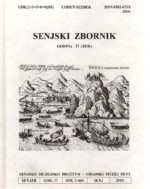Lokalno, regionalno, etnički/nacionalno – razine i čimbenici identifikacije na primjeru lovinačkoga kraja
Local, Regional, Ethnic/National – Levels and Factors of Identification through the Example of the Lovinac Region
Author(s): Kristina VugdelijaSubject(s): Customs / Folklore, Oral history, Social history, Cultural Anthropology / Ethnology, Politics of History/Memory, Politics and Identity
Published by: Senjsko muzejsko društvo i Gradski muzej Senj
Keywords: Bunjevci; identity; Lovinac region;
Summary/Abstract: Assuming that the identity of a particular community is constructed by the interaction with other communities, this work analyses the construction of the identity of the Bunjevci population in the munciplaity of Lovinac (southern Lika) on three levels, local, regional and ethnic/national. Besides of the levels of identity, analysed here are the identification means where the main starting point is the presumption of how a community is defining itself towards some other community emphasising the differing characteristics. On the local level where there exists no great cultural, 'objective', differences between individual places, in constructing borders between us-them, the 'subjective' value-based identification or stereotypes were used. On the regional level, objective factors reach out that are part of the traditional cultural inventory and are considered characteristic of the entire region of Lika, and have a peculiar meaning as symbols.Regional determination is also partly shaped with the economic contact with Dalmatians where the basis of identification is also 'objective', determined by economic context. On the third levelthere are two categories of identification, sub-ethnical (Bunjevci origins) and nationality (Croatian). Processes and the variability of identity is very visible at this level since the construction of identity comes by merging several distinguishing features, religion, ethnicity and national origin which are not always distinguished. The method of defining us and them can be seen from the name which they use to call each other, as well as their placement in a temporal/historical context. The awareness of belonging to Bunjevci is shaped by the interaction with another group; the ethnonym Bunjevci assumes significance especially in contrast with the ethnonym Vlach. Bunjevci is an identifiable sign which is determined as the others and it is understood as pejorative, as a negative attribute. According to the perceptions and understanding of most interviewees, they are not 'real' Bunjevci. The reasoning behind this can perhaps be read in the regional political situation: the ethnonym Bunjevci in opposition with Vlach ethnonyms functions as an identification code till the Second World War when the political situation starts to change, and when other identification framework was activated i.e. nationality, which became a powerful incentive in the Homeland War where the Bunjevci-Vlachs opposition was replaced with some sort of identification shift where nationality becomes more important.
Journal: Senjski zbornik - prilozi za geografiju, etnologiju, gospodarstvo, povijest i kulturu
- Issue Year: 37/2010
- Issue No: 1
- Page Range: 291-296
- Page Count: 6
- Language: Croatian

